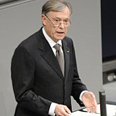
Auschwitz survivors mark camp's liberation
Commemorations at Nazi death camp, held as part of worldwide Holocaust remembrance ceremonies, include wreath-laying ceremony, prayers at foot of main memorial which stands between twisted ruins of two crematoria
In the depths of the Polish winter, Auschwitz survivors and government officials marked the 64th anniversary of the Nazi death camp's liberation Tuesday as part of worldwide Holocaust remembrance ceremonies.
The yearly commemoration honors the day the advancing Soviet army liberated the camp in 1945. The anniversary has been established as an annual Holocaust remembrance day by the United Nations.
More than 1 million people, mostly Jews, died in the camp's gas chambers or through forced labor, disease or starvation.
Tuesday's commemorations at Auschwitz include a wreath-laying ceremony and prayers at the foot of the former camp's main memorial, which stands between the twisted ruins of two crematoria.
Foreign Minister Tzipi Livni said during a ceremony marking International Holocaust Remembrance Day in Kibbutz Tel Yitzhak, that "any comparison between the Holocaust and the defense of the State of Israel is out of the question."
According to Livni, "Terrorism seeks to harm civilians, and Israel takes action against terrorism that acts under the auspices of civilians."
In Germany, President Horst Koehler praised young people's efforts to learn about their nation's history and honor the victims of the Holocaust.
"Responsibility for the Shoah is part of the German identity," Koehler in a speech to parliament.
Germany's main Jewish group, however, boycotted the ceremony, saying they were snubbed by not being officially greeted by the speakers at the event.

Ceremony at German parliament (Photo: AFP)
A ceremony was also planned at the former Sachsenhausen concentration camp outside Berlin.
In Warsaw, an antique tram car topped with the Jewish Star of David trundled through neighborhoods in what was once the Jewish ghetto of Nazi-occupied Warsaw. The tram traveled empty through the now-bustling streets of the Polish capital to symbolize the absence of those who perished in the Holocaust.
Auschwitz in state of disrepair
As aging Holocaust survivors grow frailer and fewer in number, Auschwitz-Birkenau – established by the Nazis in occupied Poland – is in such a state of disrepair that its preservation is under threat.
The Polish state officials who oversee the camp say at least €100 million ($130 million) is needed in the next 15 to 20 years to maintain the site – money that it has so far failed to raise from the international community.
Already, the museum has had to seal off crumbling barracks for fear that visitors could get injured. The remains of the former gas chambers and crematoria are also deteriorating due to the land's yearly cycle of freezing and thawing.
"These buildings weren't built to last," said Pawel Sawicki, a spokesman for the museum. "If we don't get the money, we'll have to close more and more buildings."
Germany on Monday praised Polish efforts to preserve the site and promised to help fund them. It did not cite a figure.
The museum, set up in 1947, received 12.7 million zlotys ($3.7 million) from the Polish government last year and earned about 13 million zlotys more by publishing survivor accounts, screening documentaries to visitors and from guide fees.
Private donations from abroad amount to only a small fraction of its income.










